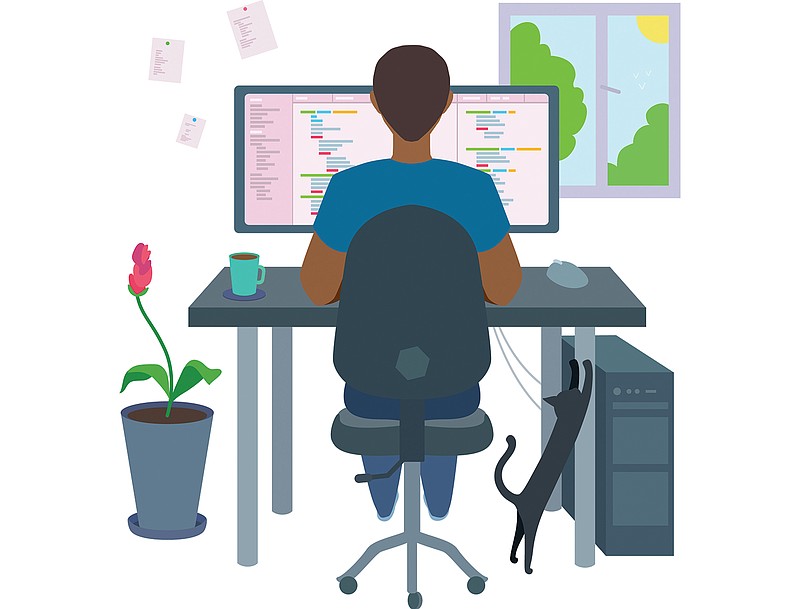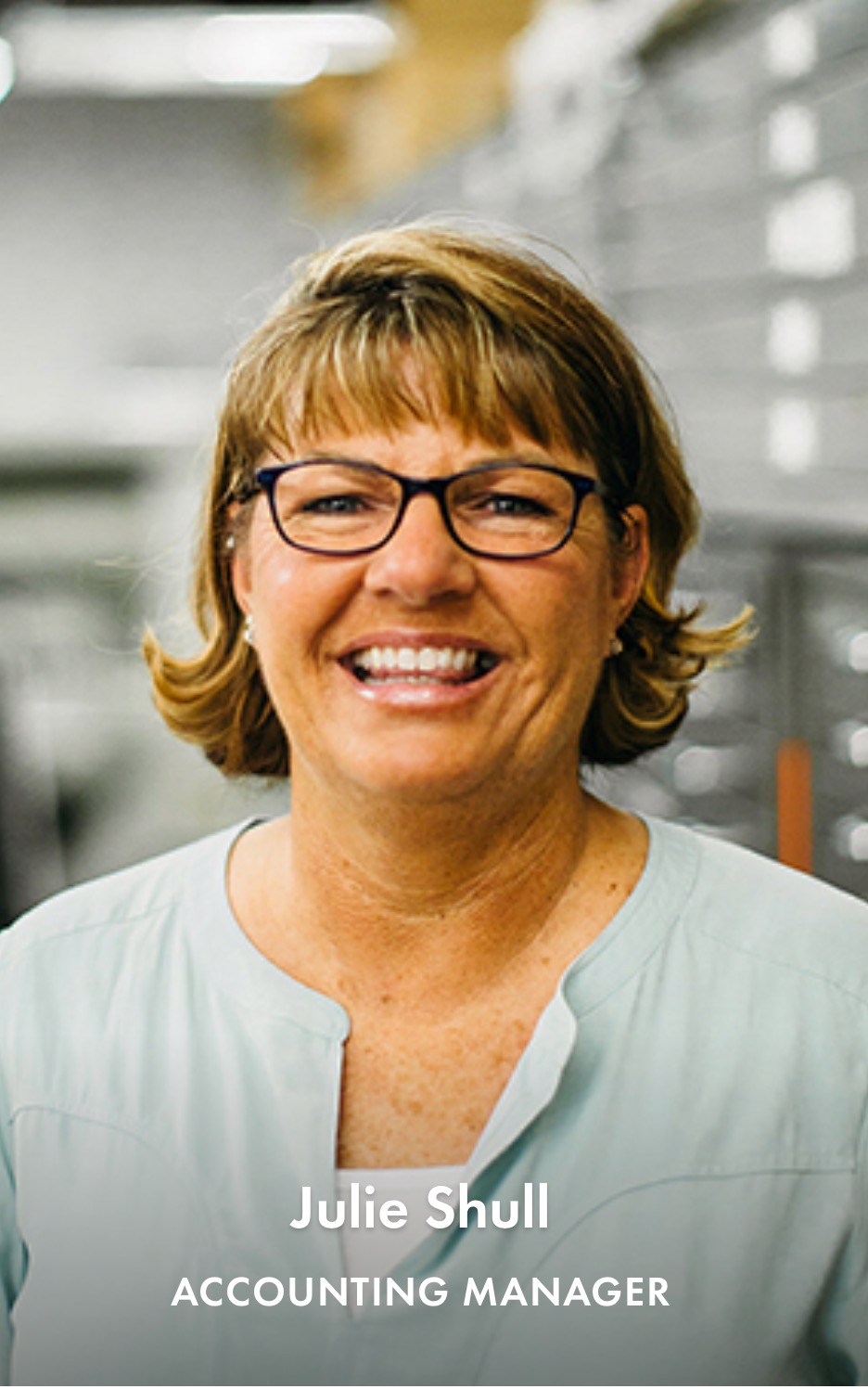Stay-at-home orders imposed during the early days of the coronavirus left many companies rethinking the 'hows' and 'wheres' of employee work arrangements, but not everyone was left scrambling.
For some, it was just another day at the home office.
For Chattanooga-area professionals Chris Ramsey, Ellen Scheid, Julie Shull and Zack Woods, working from home has been the norm for years, even decades.
Not everyone has the flexibility to work remotely, but those who have the opportunity overwhelmingly enjoy it. In a "2020 State of Remote Work" report by Buffer, which helps companies build their brands on social media, and AngelList, a job marketplace for remote work, 98% of the 3,500 workers surveyed said they want to continue working remotely, at least some of the time, for the rest of their careers.
Business consultant Erin Stewart, owner of Scenic West Design and recent Chattanooga transplant, has worked remotely for the majority of her career, initially in the Washington, D.C., area, where she's from. She started Scenic West, a remote product design and management consulting business, while living in the U.S. Virgin Islands.
Stewart says she hopes the current climate "opens up more organizations to the idea of what's possible with remote work and remote contractors," adding that, "While it's relatively common in the tech industry, I think COVID-19 will increase how common it is [in other industries] over the upcoming years."
Research shows that remote workers are happier, more productive and have a higher average income than their non-remote peers, according to career navigation site TheBalanceCareers.com.
The Buffer survey found that the key challenges with working from home are difficulties with collaboration/communication and with loneliness. But the primary benefit has remained the same for the past three years of its report: flexibility.
The Chattanooga professionals we spoke to related similar experiences.
Creating a work-from-home routine
Erin Stewart of Scenic West Design, which specializes in remote product design and management, recently led a class at The Chattery offering advice on how to establish a good work-from-home routine. Here are some of her tips.* Wake up at least an hour before you want to start work.* Create a designated space.* Limit distractions.* Take a lunch break away from your workspace.* Make time for walks or exercise.* Bring a water bottle or snack with you to “the office.”* Set a beginning and end time for your workday.* Enjoy your evening away from work and your workspace.* Get a good night’s sleep.
Chris Ramsey, 54, of East Brainerd
* Job: Self-employed insurance agent, PPE sales rep and consultant to nonprofits
* Work-from-home tenure: Five years
* Pros and cons: "The main pro is flexibility," says Ramsey. "Especially if you work for yourself, you can set your own schedule. A lot of times, people are more productive [working from home]."
Ramsey says he often works longer hours now that he's self-employed. One reason, at least for his insurance business, is fulfilling client expectations.
"Some of the work I do, especially when it comes to meeting clients, means occasionally I have to work on the weekend," he says. "I base my schedule on the availability of my clients."
Ramsey also has noted changes in the family financial ledger. Working from home can mean lower costs - "You're not eating lunch out and burning gas," he says - but he has noticed an increase in the utility bills with everyone isolating at home. He and his wife have two teenage boys at home, as well as a 25-year-old daughter who is on her own.
Ramsey worked for BlueCross BlueShield of Tennessee for 24 years and later ran a technology nonprofit before opting for self-employment. He cautions that for some workers, the lack of social connections in remote work may be an adjustment.
"Not being around a workplace, you feel somewhat isolated," he says. "My job is different. I'm still interacting with people a lot [by phone]. But people who are looking at a computer all day may feel like they're missing out when they're not in an office space with people around."
* Where he works: "My home office is in my basement," says Ramsey. "It's totally removed from everything that takes place upstairs in my home. It's a quiet space."
* His best advice: "Wake up every morning like you're going to work [outside the home]. Get out of bed; take your shower; prepare for your workday. You don't have to dress in a suit and tie, but dress like you're going to work so that it feels like you're in a work office.
"The other thing is good internet reception, especially if you're doing Zoom calls or teleconferencing," Ramsey adds. "Make sure you have the appropriate technology. You don't want disruptions and disconnects."
Ellen Scheid, 37, of Soddy-Daisy
* Job: Accountant for Ryan Boer Solutions Inc., a California firm that employs payroll clerks, bookkeepers, accountants and auditors across the country
* Work-from-home tenure: A year and a half
Scheid says she previously worked in an office environment until her maternity leave was almost over and she was laid off. "We had to decide if it was worth me going back to work to an office setting and pay the high costs of day care or find a company where I could work remotely," she says, adding, "Remote work was best for us."
* Pros and cons: "The biggest pro is getting to be with our son 100% of the time," says Scheid. "Also the flexibility with hours is nice. Honestly, the only 'con' I have is that I don't get out much."
Scheid says she typically works while her 21-month-old son naps or after he goes to bed. "Occasionally, my boss wants to chat via video conference, but other than that I work on my own schedule. It is easy, in my case, since they are three hours behind us."
Still, there are plenty of distractions competing for her time, including three rescue dogs.
"My husband travels often for work, so when he is gone I tend to everything around the house, which includes taking care of our son, fur babies, house and veggie garden," she says. "When my husband is home he likes us all to do things together, so I have to manage my work a bit different for those days. Another time-consuming issue I have is that we aren't from Tennessee, so we like to visit our home states."
* Where she works: Scheid says her home has a dedicated office space, adding that, "The company sent me a preprogrammed computer, so I had no out-of-pocket expenses."
* Her best advice: "Figure out the best schedule for yourself, and stick to it. It takes a while to adjust, but once you get a set schedule it is very easy. Working from home isn't for everyone, though. It definitely takes some self-motivation. Don't be ashamed if it isn't right for you."
Julie Shull, 56, of Ringgold, Georgia
* Job: Self-employed accounting manager
* Work-from-home tenure: 22 years
* Pros and cons: Because Shull keeps the books for multiple Chattanooga-area clients, she has multiple bosses, but ultimately she sets her own schedule and workflow. She cites convenience as one of the biggest perks of working from home.
"If you need to clock out and run to the school because your child forgot their homework, you don't have to feel bad for leaving or having to ask your boss," says Shull, mother of four children ages 28, 27, 19 and 15.
Another plus is not having the expense of dressing for an office environment. "Shorts and T-shirt are my go-to," she says.
Shull also says she is able to concentrate solely on the work at hand, rather than getting caught up in the workplace vibe.
"For me personally, there are less distractions," she says, citing chitchatting with fellow workers, office drama and gossip as pitfalls she happily avoids.
Still, there are drawbacks. Remote working means you're "out of sight, out of mind," says Shull, "so some things are not communicated to you like they would be in an office."
Perhaps the biggest drawback, though, is the inability to leave the job behind.
"It's hard to walk away when I know there are things that need to get done, making some days very long," she says. "I know most folks that work from home have designated hours, but I feel like I get paid to get a job done, regardless of how long it takes."
* Where she works: "I converted one of our bedrooms into an office, and I only work in the designated space," Shull says. "I made made it an inviting place so it is fun to get up and go to work every day. I look forward to it."
* Her best advice: "Working from home is not for everyone. I have people tell me all the time they want a job where they can work from home. Then when that happens, they can't get their work done. You have to be very self-disciplined, a self-starter and not easily distracted."
Zack Woods, 32, of Red Bank
* Job: Customer service representative in provider interplan operations for BlueCross BlueShield of Tennessee
* Work-from-home tenure: Almost four years
* Pros and cons: Woods says he particularly enjoys the "very flexible schedule," though his breaks are structured to make sure there's someone on the team answering calls.
He also likes working a job where he's not micromanaged, the result of a comprehensive training program that prepared him for whatever calls come in from providers looking for policy guidance.
He previously worked as an Amazon ambassador, which provided opportunities to travel. Now, he's tethered to a telephone headset and more sedentary.
"Sitting down is probably my main challenge," Woods says. "Working at home, I'm looking for chances to get up - walking the dog, moving around, trying to get my steps in. I like to be active."
Woods says BlueCross tracks worker productivity, and he believes he is more focused when he's working from home.
"This allows me to not have any distractions," he says. "I find it an easier way to go about the daily business."
Woods lives maybe 10 minutes from company headquarters on Cameron Hill, so showing up at the office is not an inconvenience. Before the coronavirus necessitated working from home, Woods, like many other BlueCross employees, had the option of working from the cubicle.
"I'd go back to the hill and work for a little while," he says. "I'd see people, work out at the fitness center. They have an unbelievable cafe I really miss."
* Where he works: Woods says he has an office set up in his home with furniture supplied by his employer. "BlueCross provided me with a beautiful desk with everything I need, just like working on the hill."
The right chair, he adds, "can go a long way when you're sitting all the time."
When his wife temporarily worked from home during shelter-in-place restrictions, she set up her work area in the kitchen so their phone conversations wouldn't overlap. Woods' office needs to be a place "free of any distractions," he says.
* His best advice: "Really, having a set routine," he lists as No. 1, then adds, "Limiting your distractions that can cause you not to focus on the work that needs to be done. If the TV is going to be a distraction, turn it off."
Woods says he may mow the lawn during his lunch break or start dinner as the workday winds down, but he doesn't let household chores take him away from his time on the clock. Structure is key.
"Routine is really huge. It's something I really strive to keep day in and day out."




